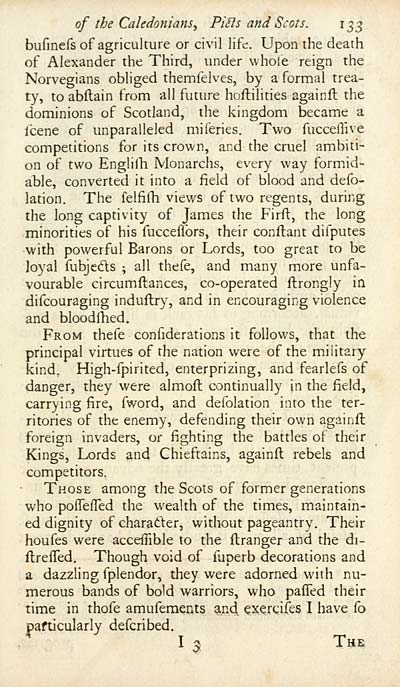Blair Collection > Critical dissertations on the origin, antiquities, language, government, manners, and religion, of the antient Caledonians, their posterity the Picts, and the British and Irish Scots
(171)
Download files
Complete book:
Individual page:
Thumbnail gallery: Grid view | List view

of the Caledonians, Picis and Scots. 133
bufinefs of agriculture or civil life. Upon the death
of Alexander the Third, under whole reign the
Norvegians obliged themfelves, by a formal trea-
ty, to abftain from all future hoftilities againfl the
dominions of Scotland, the kingdom became a
Icene of unparalleled miferies. Two fuccellive
competitions for its crown, and the cruel ambiti-
on of two Englilh Monarchs, every way formid-
able, converted it into a field of blood and defo-
lation. The felfilh views of two regents, during
the long captivity of James the Firft, the long
minorities of his fucceffors, their conftant difputes
with powerful Barons or Lords, too great to be
loyal fubjcds ; all thefe, and many more unfa-
vourable circumftances, co-operated ftrongly in
difcouraging induftry, and in encouraging violence
and bloodlhed.
From thefe confiderations it follows, that the
principal virtues of the nation were of the military
kind, High-fpirited, enterprizing, and fearlefs of
danger, they were almofl continually in the field,
carrying fire, fword, and defolation into the ter-
ritories of the enemy, defending their own againft
foreign invaders, or fighting the battles of their
Kings, Lords and Chieftains, againfl rebels and
competitors.
Those among the Scots of former generations
who poffeiTed the wealth of the times, maintain-
ed dignity of charafter, without pageantry. Their
houfes were acceflible to the flranger and the di-
ftrefled. Though void of iuperb decorations and
a dazzling fplendor, they were adorned with nu-
merous bands of bold warriors, who pafled their
time in thofe amufements and exergifes I have fo
particularly defcribed.
I cj TijR
bufinefs of agriculture or civil life. Upon the death
of Alexander the Third, under whole reign the
Norvegians obliged themfelves, by a formal trea-
ty, to abftain from all future hoftilities againfl the
dominions of Scotland, the kingdom became a
Icene of unparalleled miferies. Two fuccellive
competitions for its crown, and the cruel ambiti-
on of two Englilh Monarchs, every way formid-
able, converted it into a field of blood and defo-
lation. The felfilh views of two regents, during
the long captivity of James the Firft, the long
minorities of his fucceffors, their conftant difputes
with powerful Barons or Lords, too great to be
loyal fubjcds ; all thefe, and many more unfa-
vourable circumftances, co-operated ftrongly in
difcouraging induftry, and in encouraging violence
and bloodlhed.
From thefe confiderations it follows, that the
principal virtues of the nation were of the military
kind, High-fpirited, enterprizing, and fearlefs of
danger, they were almofl continually in the field,
carrying fire, fword, and defolation into the ter-
ritories of the enemy, defending their own againft
foreign invaders, or fighting the battles of their
Kings, Lords and Chieftains, againfl rebels and
competitors.
Those among the Scots of former generations
who poffeiTed the wealth of the times, maintain-
ed dignity of charafter, without pageantry. Their
houfes were acceflible to the flranger and the di-
ftrefled. Though void of iuperb decorations and
a dazzling fplendor, they were adorned with nu-
merous bands of bold warriors, who pafled their
time in thofe amufements and exergifes I have fo
particularly defcribed.
I cj TijR
Set display mode to: Large image | Transcription
Images and transcriptions on this page, including medium image downloads, may be used under the Creative Commons Attribution 4.0 International Licence unless otherwise stated. ![]()
| Permanent URL | https://digital.nls.uk/76288492 |
|---|
| Description | A selection of books from a collection of more than 500 titles, mostly on religious and literary topics. Also includes some material dealing with other Celtic languages and societies. Collection created towards the end of the 19th century by Lady Evelyn Stewart Murray. |
|---|
| Description | Selected items from five 'Special and Named Printed Collections'. Includes books in Gaelic and other Celtic languages, works about the Gaels, their languages, literature, culture and history. |
|---|

